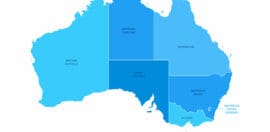New Aussie survey shows discrimination persists towards some minorities

5 February 2021 at 5:56 pm
The Scanlon Foundation has released its latest Mapping Social Cohesion report
There is a “substantial negative sentiment” towards Australians of African, Asian and Middle Eastern heritage, according to new research that’s prompted calls for a national anti-racism strategy.
The 2020 Mapping Social Cohesion report found that strong overall support for multiculturalism was marred by discriminatory attitudes towards certain minorities.
This annual report from the Scanlon Foundation tracks Australian attitudes on issues including immigration, multiculturalism, discrimination and political trust.
Two surveys were held last year, one in July and the other in November, to gauge the views of Australians amid the chaos of the COVID-19 pandemic.
While 84 per cent of respondents agreed that “multiculturalism has been good for Australia”, almost half (49 per cent) reported negative feelings towards people of Iraqi and Sudanese backgrounds, while 47 per cent felt the same towards Chinese-Australians.
The research also reflected the rise in racism against Asian people in Australia due to COVID-19, with 39 per cent of Asian-born participants reporting increased racism during the pandemic.
But the report’s author, Emeritus Professor Andrew Markus, told Pro Bono News that the findings were overall “surprisingly positive” given the upheaval of 2020.
He noted that support for multiculturalism rose by 4 per cent last year, and said the report’s index of social cohesion moved in a positive direction.
But he admitted there was still a “hierarchy of ethnic preference” in Australia.
“And so you get more negative perceptions of immigrants from Asian countries, the Middle East and Africa,” Markus said.
“That’s what we had in the past and we found it again this time around.”
Minister for Multicultural Affairs Alex Hawke said he welcomed the report and said the Morrison government was committed to social cohesion as a key part of its pandemic response.
“While the vast majority of Australians welcome people from all backgrounds and are committed to giving everyone a fair go, racism is still an unwelcome and unacceptable feature of too many attitudes,” Hawke said.
“This is why the Morrison government will continue to heavily invest in Australia’s social cohesion, and work to counter the extreme elements that promote racism in our multicultural communities.”
In wake of the report’s findings, Labor is calling for a national anti-racism strategy to be implemented.
The ALP’s multicultural affairs spokesperson Andrew Giles said rising concerns about racism required action and consistent leadership from the federal government.
“Labor believes that multiculturalism is one of Australia’s greatest achievements. However, this report demonstrates that we can’t take our success for granted,” Giles said.
“We need leadership that brings Australians together, not divides us.”
Markus agreed that a national anti-racism approach was needed to combat the problem, since it had always been an underlying issue and wasn’t something that would fade away once the pandemic ended.
He did note though that sometimes the degree of racist sentiment in the community could be overestimated.
With reports of Neo-Nazis making themselves more prominent in Australian society, there have been concerns recently about rising anti-Semitic attitudes in Australia.
But Markus noted that only nine per cent of people reported negative views towards Jewish people in the survey, which was lower than it was for Christians (11 per cent) and substantially lower than the rate for Muslim people (37 per cent).
“As someone said to me, just looking at Twitter, you would think that attitude to Jewish people is like 50/50 [positive and negative], whereas in actual fact it’s nine per cent negative,” he said.
“If you’re just looking at social media, you can get a very skewed understanding of the balance of Australian opinion.
“So any anti-racism strategy must understand the goodwill of a great majority of the Australian population and understand that these [racist] groupings… are actually a small minority.”







